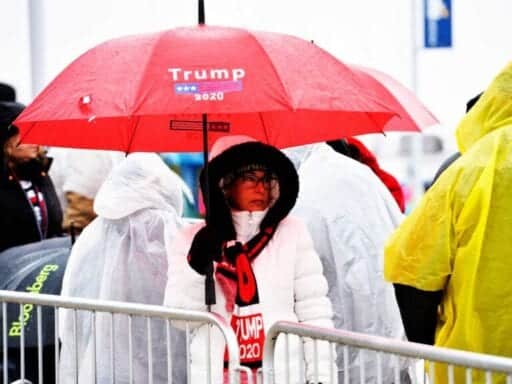More than a dozen candidates — alongside President Trump — are running for New Hampshire’s delegates.
The New Hampshire Republican primary is a weird one.
Not because it’s at all in doubt. After former Republican Rep. Joe Walsh dropped out of the race following the Iowa caucuses — saying that he’d “rather have a socialist in the White House” than Donald Trump — the GOP primary is down to two candidates. They are former Massachusetts Gov. Bill Weld and Trump, the president of the United States. Trump’s approval rating with Republicans in the state is 90 percent, according to the University of New Hampshire, and 94 percent nationally.
But in New Hampshire, Trump and Weld won’t be alone on the ballot. Because of the Granite State’s freewheeling primary rules (write-in votes are encouraged and getting on the ballot costs just $1,000), the New Hampshire GOP primary features more than a dozen candidates.
They include perennial candidate Roque “Rocky” De La Fuente, a San Diego businessman who ran for Senate in nine states in 2018, and Zoltan Istvan, an advocate for transhumanism who describes himself as a “cyborg” and has campaigned on the slogan “Upgrade America.” The “lesser known” candidates even have their own debate of sorts, aptly titled the Lesser-Known Candidates Forum. None of them are expected to win — Decision Desk, Vox’s live results partner, even has them grouped together in an “Other” category — but it could make for a fun wrinkle.
And Trump, who has a fraught relationship with the state after it gave him his first win of the 2016 primary cycle but then went for Hillary Clinton in the general election, isn’t missing an opportunity to drum up support. He’s holding a rally in Manchester on Monday night, and Trump campaign surrogates arrived in the state on Sunday.
Vox will be covering the results live, in partnership with Decision Desk HQ:
Trump’s main GOP opposition
Suffice it to say, Weld does not have much chance against Trump. While Weld has polled well in New Hampshire, his numbers are far outmatched by Trump’s.
But when we spoke last summer, Weld told me he saw possibilities in New Hampshire Republicans, holding more than 200 events in the state since he announced his candidacy. His focus is on restoring “normalcy” to the Republican Party as a “real Republican.” When I asked him about Trump’s considerable popularity with the GOP, he told me, “I’m not willing to concede your premise. I will concede that I’m a normal Republican, and the implication of that is that Mr. Trump is a Republican in name only.”
And when I asked him how he’d appeal to Republican voters who disliked Trump, he said:
There’s a lot of those in New Hampshire, and it may be just that New Hampshire Republicans like me, but when I talk to them, people in diners, at meet-and-greets, or at old home weeks, city fairs, as they’re called, I don’t sense approval of Trump. I get a lot of eye-rolling, and maybe two or three voters out of 100 would say, “No, no, Trump’s my guy.” But I can remember not so long ago shaking over 200 hands in three diners in New Hampshire and not encountering a single Trump supporter. The party is 100 percent behind him, but that’s because the party in every one of the 50 states is the Trump organization.
He believes Republican voters are looking for fiscal conservatism and a small-government ethos from a presidential candidate willing to “stand up for the taxpayer.”
Weld has a lengthy political history, as I detailed last year:
He served as the Republican governor of Massachusetts from 1991 to 1997 — a popular tenure for a moderate Republican in a blue state, though with some controversy among conservatives who decried the expansion of government that took place under his watch.
He helped George W. Bush prepare to debate John Kerry in 2004, but endorsed Barack Obama in 2008 after Mitt Romney, himself a former Massachusetts governor, dropped out of the race (Weld was a co-chair of Romney’s campaign efforts in New York).
In 2016, Weld ran for the vice presidency as Gary Johnson’s running mate on the Libertarian Party ticket.
In an interview with the Huffington Post, Weld said that no matter what took place in New Hampshire, his campaign would continue through Super Tuesday — because Nevada and South Carolina have canceled their caucuses and primary to protect Trump.
Author: Jane Coaston
Read More



